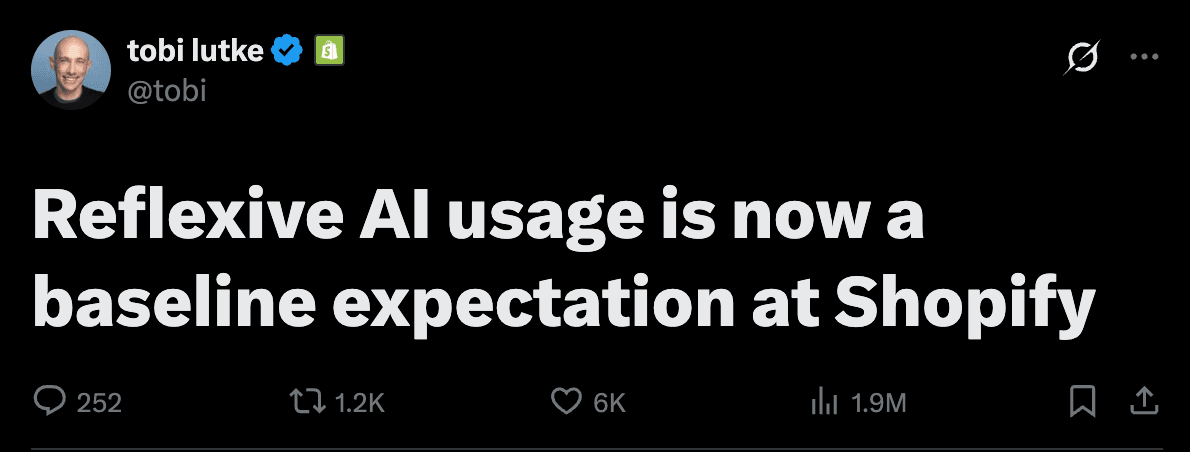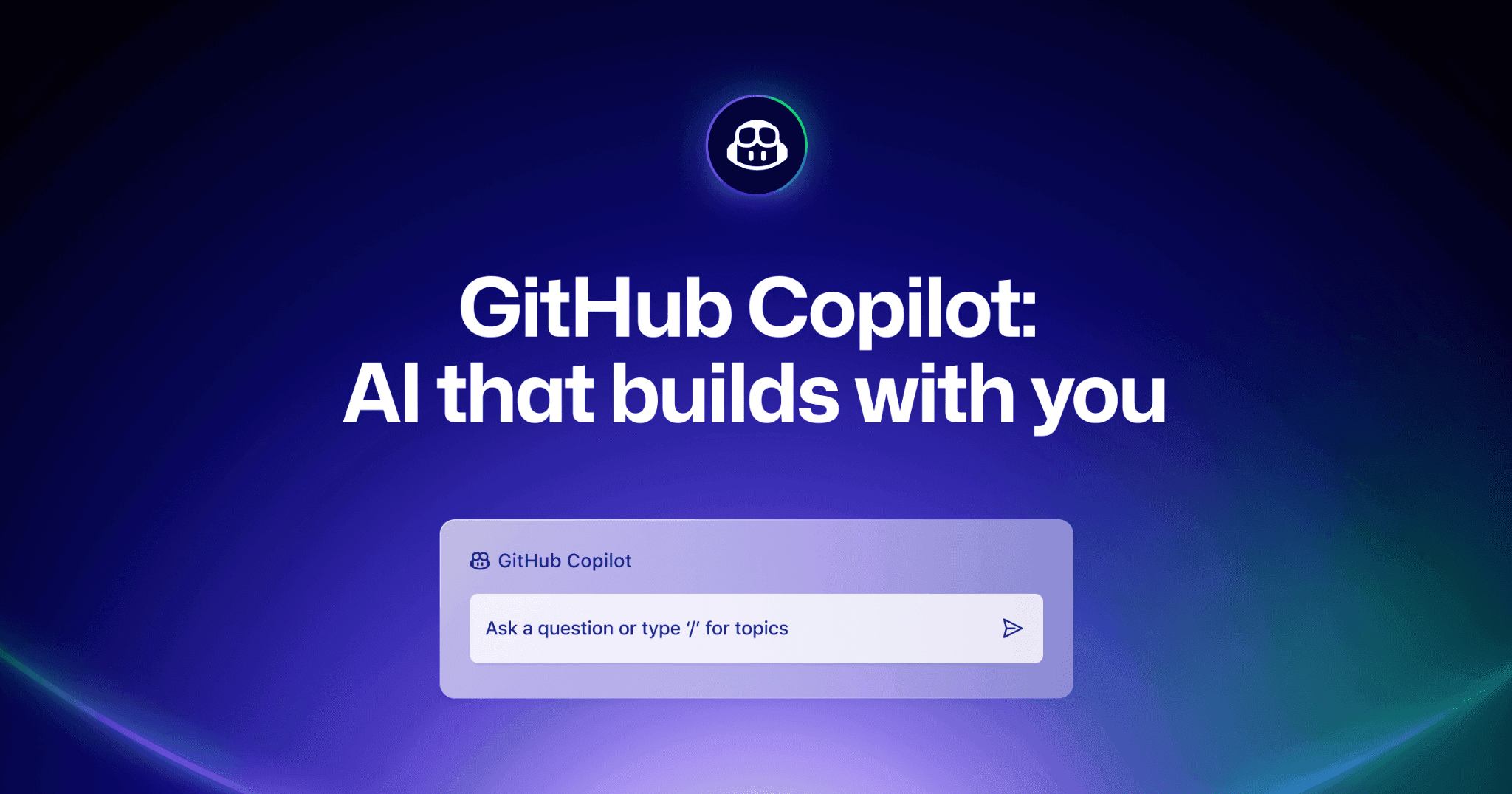Shopify CEO: AI Agents Before New Hires - A New Workplace Reality
Shopify has just made a game-changing announcement that could reshape how we think about work in the AI age. Shopify CEO Tobi Lütke's leaked internal memo reveals a bold new requirement: all Shopify employees must now become proficient with AI tools or risk falling behind.
This isn't just another corporate policy change—it's a glimpse into how companies might soon view the relationship between human workers and artificial intelligence. In this article, we'll break down what this means for Shopify employees, how the company is implementing its AI-first approach, and what signals this sends to the broader job market.
As businesses everywhere grapple with AI integration, Shopify's decisive stance offers valuable insights into what the future of work might look like. Let's get into it.
What Happened: The AI Memo Explained

Shopify's CEO Tobi Lütke recently shared an important memo with his team that has now become public. In this memo, he made a big announcement: Everyone at Shopify must now know how to use AI in their daily work. He called this "reflexive AI usage" and said it's now a "baseline expectation" for all employees.
"Reflexive AI usage" simply means using AI tools naturally and regularly in your work without having to think about it - just like how we use computers or smartphones today without thinking twice.
It means AI should become a normal part of how employees think, solve problems, and complete tasks.
- The memo was first shared inside the company but was later made public when it was about to be leaked
- Lütke wants employees to use AI as a "thought partner, deep researcher, critic, tutor, or pair programmer"
- He believes AI skills are not optional anymore - they're essential for everyone at Shopify
- The company will now include questions about AI usage in performance reviews
- Teams must prove why AI can't do certain jobs before they can ask for more people or resources
Lütke explained that learning to use AI effectively takes practice and is a skill that must be developed through regular use. He sees AI as a powerful tool that can multiply what top performers can accomplish, enabling them to tackle tasks that would have seemed impossible before.
He noted in the memo that before asking for more headcount or resources, teams must first demonstrate why AI can't accomplish the task. He also raised the idea of imagining what the team would look like if autonomous AI agents were already part of it—highlighting a preference for exploring AI solutions over hiring more staff.

Why Shopify is Going All-In on AI
Shopify is fully embracing AI because it sees huge benefits for the small business owners who use its platform. The company believes AI can make starting and running a business much easier by helping with many tasks that usually need special skills or knowledge.
In his memo, CEO Tobi Lütke describes AI as a "multiplier" for work. This means AI doesn't just help you do things a little faster - it dramatically increases what you can accomplish:
- AI can act as a helper that gives advice, does research, and even completes tasks for merchants
- It helps entrepreneurs make better decisions by providing guidance and knowledge
- For Shopify employees, AI enables them to tackle problems they wouldn't have even tried to solve before
Lütke's "100X work" claim is straightforward: he's seeing that when talented people use AI effectively, they can accomplish about 100 times more than what was previously possible. This massive boost in productivity is why Shopify believes AI skills are no longer optional but essential.
AI Tools Shopify is Using

Shopify has equipped its teams with various AI tools to help them work more efficiently. The memo mentions several specific AI technologies that different teams across the company are now using daily.
For developers and technical teams, Shopify provides access to:
- GitHub Copilot - helps write and suggest code
- Cursor - an AI-powered code editor
- Claude Code - designed specifically for coding assistance
- Proxy - likely an internal AI tool for developers
For company-wide communication and AI support, Shopify has:
- chat.shopify.io - an internal AI chat platform they've had for years
- Dedicated Slack channels like #revenue-ai-use-cases and #ai-centaurs where employees share effective AI prompts
To make sure everyone benefits from what others are learning, Shopify has created several knowledge-sharing systems:
- Employees are encouraged to share both successes ("Ws") and failures ("Ls") with AI experiments
- The company has set up spaces in their internal Vault system for storing useful AI prompts
- Monthly business reviews now include dedicated time to discuss AI integration
- Product development cycles have specific AI components built in
These tools and systems show that Shopify isn't just talking about AI—they're providing real resources to help employees adopt AI in their everyday work.
What This Means for the Job Market

Shopify's approach to AI stands out from that of other companies. While some businesses are moving cautiously with AI or even banning it altogether, Shopify is making AI skills a requirement for all employees. This bold stance signals a growing divide in how companies view AI adoption.
The most significant change is how Shopify now thinks about growing its workforce. Instead of automatically hiring more people when workloads increase, teams must first show why AI can't handle the tasks. This represents a fundamental shift in business thinking - from "we need more people" to "can AI do this instead?"
As this approach spreads to other companies, certain skills will become more valuable in the job market:
- AI prompt engineering - knowing how to effectively communicate with AI tools
- AI result evaluation - being able to judge if AI output is good enough or needs improvement
- AI integration - connecting AI tools with existing systems and workflows
- Strategic thinking - focusing on work that truly needs human creativity and judgment
- Learning agility - being able to quickly adapt to new AI tools as they develop
Lütke mentions a "red queen race" in his memo, referring to a scene from Alice in Wonderland where characters must run just to stay in the same place. In the job market, this means workers now need to improve their skills just to maintain their value continuously.

As AI capabilities grow, the skills that make someone valuable today might not be enough tomorrow, creating a constant need to learn and adapt.
This shift suggests that job growth might slow in areas where AI excels, while creating new opportunities for those who can effectively work alongside AI systems.
Conclusion
Shopify's bold move to make AI skills mandatory marks a significant turning point in how businesses approach AI adoption. By requiring all employees to use AI as naturally as they use computers, Shopify is preparing for a future where AI becomes essential to staying competitive.
This shift will likely inspire other companies to follow suit, changing hiring practices and redefining valuable job skills. For workers everywhere, the message is clear: Developing AI skills isn't just about staying ahead—it's about staying relevant.
As AI continues to transform the workplace, both companies and employees who embrace this change will be better positioned for success in this new era of work.
FAQs
1. What does "reflexive AI usage" mean at Shopify?
Reflexive AI usage means using AI tools naturally in daily work without conscious effort, similar to how we use computers. At Shopify, it's about employees instinctively using AI for problem-solving, research, and task completion, making it a seamless part of their workflow.
2. How is Shopify measure employee AI skills?
Shopify is including AI usage questions in performance and peer reviews. They're evaluating how well employees integrate AI into projects, especially during prototype phases. Teams must also demonstrate they've explored AI solutions before requesting additional headcount or resources.
3. What AI tools are Shopify employees required to use?
Shopify provides several AI tools, including GitHub Copilot, Cursor, and Claude Code for developers, plus chat.shopify.io for all employees. They've created dedicated Slack channels like #revenue-ai-use-cases, where employees share effective prompts and learnings from AI experiments.
4. Will Shopify hire fewer people because of AI adoption?
Likely yes. Lütke's memo specifically requires teams to prove why AI can't handle work before requesting new hires. This signals a fundamental shift in workforce planning, with AI becoming the first solution to try before adding human resources.
5. How will Shopify's AI mandate affect other companies?
Shopify's approach will likely influence other forward-thinking companies to make AI skills mandatory while reshaping hiring practices. This could create market division between AI-first companies and those moving more cautiously, affecting which skills become most valuable in the job market.

Comments
Your comment has been submitted